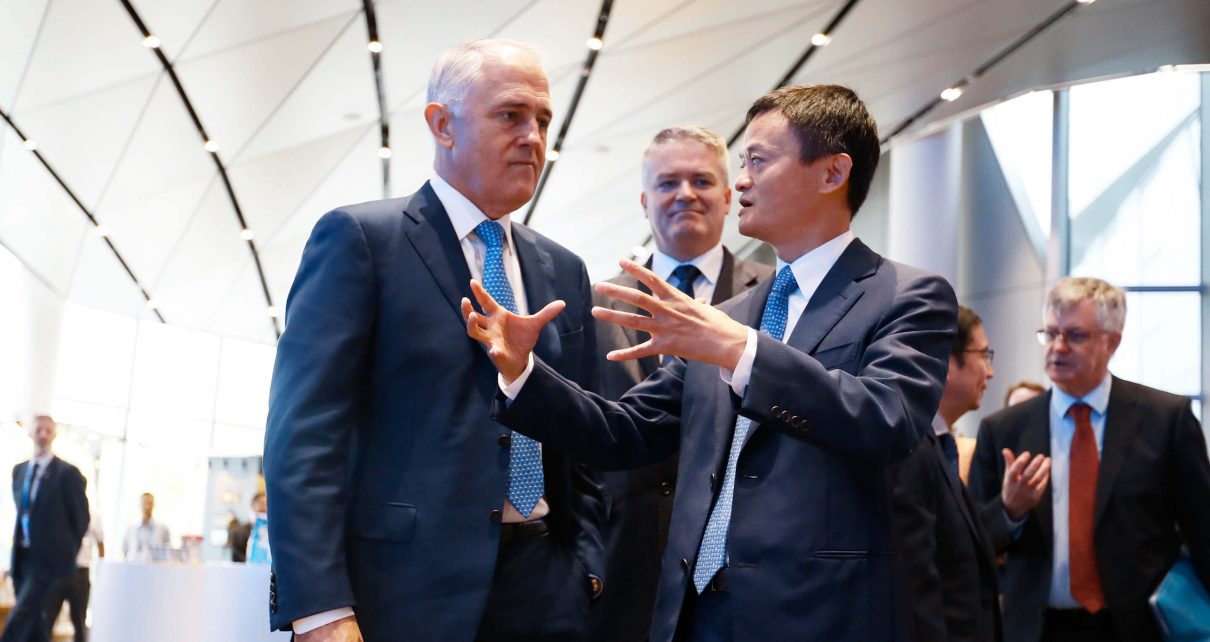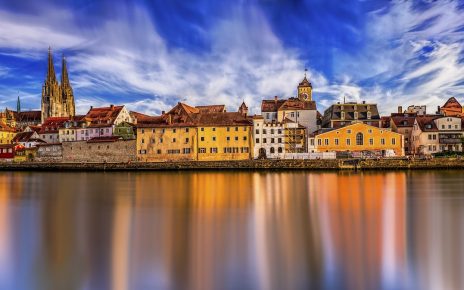Jack Ma is one of China’s richest men, with a fortune valued at nearly $30 billion. As executive chairman of Alibaba Group, he leads the dominant force in Chinese e-commerce, a company with a market value of $264 billion and some 450 million customers. A global ambassador for Chinese business, he spent 800 hours aloft last year—visiting princes, Presidents, and Prime Ministers and lots of mere businesspeople too. “A professional pilot cannot travel that much, or so I’m told,” he boasts.
Even so, the rich and powerful people who meet with Ma tend to come away from the experience with a fresh nugget of information, either about him or about the still poorly understood digital conglomerate he started with a bunch of friends 18 years ago in the provincial coastal city of Hangzhou. Jim Kim, a physician who is the president of the World Bank, met Ma four years ago over a dinner lasting more than three hours and was startled to find the billionaire wearing sandals, holding Buddhist prayer beads, and sitting cross-legged on his chair. Kim was so taken with Ma’s passion for facilitating global trade by focusing on small-business people that he’s rethinking his international development organization’s approach.
Photograph by Tony Law
Others are moved by Ma’s humanity. Jean Liu, president of Chinese ride-hailing startup Didi Chuxing, has known Ma for years and considers him a mentor. (Alibaba is a Didi shareholder.) She recently learned, through family connections rather than from Ma, about how he repeatedly visited a seamstress he had met after learning she was ill. Says Liu: “He genuinely cares about the people around him.”
Then there’s the President of the United States, who met Ma for the first time a few weeks before his Inauguration. “Trump didn’t know that much about Alibaba,” reports company president Michael Evans, a former Goldman Sachs banker and Asia hand who helped set up the powwow. “He was fascinated to hear that Chinese consumers are interested in buying from U.S. small businesses. I don’t think that had occurred to him.” Ma used the sit-down to make a bold promise—that Alibaba would help create 1 million jobs in the U.S. over five years. The pronouncement was music to the President-elect’s ears. “It was a great meeting,” he declared before the cameras in the lobby of Trump Tower, a beaming Ma beside him. “Jack and I are going to do some great things.”
Jack Ma (R), met with President-elect Donald Trump at Trump Tower on Jan. 9, 2017, and pledged to create 1 million jobs in the U.S.
Jack Ma (R), met with President-elect Donald Trump at Trump Tower on Jan. 9, 2017, and pledged to create 1 million jobs in the U.S.
TIMOTHY A. CLARY—AFP/Getty Images
President Trump isn’t the only one who could stand to learn more about Alibaba. Despite its heft in China and the blockbuster 2014 public offering that raised $25 billion on the New York Stock Exchange and introduced Alibaba to Western investors, Ma’s company remains a mystery to most non-Chinese. There’s a simple reason for that: Few outside the world’s second-largest economy are Alibaba customers. Ma is aware of this knowledge gap. It’s part of what drives him to keep logging frequent-flier miles to educate people about his company and his plans.
To realize his vision—which relies on technology to buy, sell, finance, and deliver goods on Alibaba’s digital platforms around the world—Ma has been busily recasting himself of late as a global leader. Already he is the first Chinese business executive who can claim to have transcended his homeland for the world stage. In his travels, Ma promotes the lowering of trade barriers, touts his own brand of philanthropy, and supports causes such as primary-school education. His version of globalization is carefully calibrated and expansive enough to be consistent with the goals of his own President, Xi Jinping, as well as with Trump’s America-first positioning.
Ma (L) hosted Canadian Prime Minister Justin Trudeau at Xixi Campus in Hangzhou, China, on September 3, 2016.
Ma (L) hosted Canadian Prime Minister Justin Trudeau at Xixi Campus in Hangzhou, China, on September 3, 2016.
VCG via Getty Images
As with so many effective leaders, Ma’s motives are complex. China is already a huge consumer market and one that’s still growing fast, but Ma knows that eventually he will need to conquer new territories for Alibaba to continue on its current trajectory. Like other Chinese champions, Alibaba has thrived at home while foreign competitors have thus far been stymied from entering his turf. If that changes, foreign markets will be even more crucial. Ma also needs for Alibaba—plagued by criticism over the profusion of counterfeit wares for sale on its sites—to develop a reputation as trusted around the world as Jack Ma is cherished by his fellow bold-faced names.
Ma’s opportunity is unique. After centuries of stagnation, his country has recently reassumed its position as a world leader—just as Alibaba, one of its marquee corporate names, has joined the ranks of world-beating companies. With characteristic intuition, Ma, 52, seems to realize that this is his moment to go beyond merely being famous and take his place among the globe’s revered business leaders.
Adding Up Alibaba
Founded: 1999
Employees: 46,819
Headquarters: Hangzhou, China
Annual active buyers in China: 443 million
Countries with buyers using Alibaba: 200+
Annual revenue*: $21.7 billion
Annual profits*: $5.8 billion
Market value: $264 billion
*12 months ended Dec. 31, 2016
Squaring off against Amazon
If you’re reaching for comparisons, Ma lines up favorably against a certain dogged American e-commerce entrepreneur: Amazon CEO Jeff Bezos, No. 1 last year on Fortune’s annual list of the world’s greatest leaders. Both are famous for their tenacity, their management philosophies, and their growing list of significant side ventures. (Like Bezos, Ma now owns a venerable newspaper.) One surprise, as the two companies enter the early phases of squaring off against each other outside their respective home markets, is that Alibaba’s business is actually better than Amazon’s, at least in terms of its profitability. Plus, Ma arguably has more felicitous government relationships than Bezos—both in Beijing and in Washington, D.C., given that the Bezos-owned Washington Post has repeatedly drawn Trump’s ire.
Ma’s current standing with the White House, however, rests heavily on his job-creating pledge to President Trump. And that bold promise is built on a bit of nuance. Specifically, Ma predicted that Alibaba will sign up 1 million U.S. small businesses to its various e-commerce platforms, primarily Taobao, its mass-selling site for individuals, and Tmall, its higher-end site for established consumer companies. In China, Alibaba hosts 10 million merchants, and it has estimated that those businesses account for 30 million jobs. The 1-million-job pledge updated a general goal of helping U.S. small businesses sell in China that Ma had posited a year earlier in a Wall Street Journal op-ed. The company now estimates that each U.S. business that sells on Alibaba’s platforms will typically hire one employee as a result, hence the 1 million new jobs.
Ma (R) introduces to Prime Minister Malcolm Turnbull about Alibaba Group at the headquarter of Alibaba Group at Xixi Campus on September 6, 2016 in Hangzhou, Zhejiang Province of China.
Ma (R) introduces to Prime Minister Malcolm Turnbull about Alibaba Group at the headquarter of Alibaba Group at Xixi Campus on September 6, 2016 in Hangzhou, Zhejiang Province of China.
VCG via Getty Images
Unpacked, the big promise is classic Ma, a born promoter and natural communicator with a finely tuned ear to the needs of government officials. Duncan Clark, a China-based investment adviser and the author of the comprehensive 2016 book Alibaba, the House That Jack Ma Built, labels the move equal parts “theatrics” and effective. “To me, it broke the tension,” says Clark, at a time of deteriorating U.S.-China relations. “Jack is very good at seducing and working the room.” A few weeks later, he notes, Ant Financial, an Alibaba affiliate controlled by Ma, announced plans to acquire the Texas payments firm Moneygram for $880 million, an offer subsequently topped by the U.S. firm Euronet. Alibaba would have needed the U.S. government’s blessing to prevail in the deal.
Many assumed Ma’s bonding with Trump presaged an Alibaba move into selling to U.S. consumers. For now, Alibaba professes to be more interested in helping U.S. businesses sell to Chinese consumers rather than the other way around. “People are always asking ‘What’s your U.S. strategy? What’s your U.S. strategy?’ ” says Evans, Alibaba’s president. What it isn’t, he says, is competing against Amazon in the U.S. Instead, Alibaba’s designs on the U.S. are threefold: work with established brands to sell on Tmall; help small businesses—the ones that would create new jobs—sell in China on Taobao; and match U.S. manufacturers with Chinese component makers on Alibaba.com, the company’s original business. Evans says Tmall hosts 7,000 U.S. brands. Alibaba doesn’t disclose U.S. figures for the other two categories, presumably because they are too small.
John McPheters, CEO of hip sneaker consignment retailer Stadium Goods in New York City, says Alibaba will account for 10% of his company’s online sales this year.
John McPheters, CEO of hip sneaker consignment retailer Stadium Goods in New York City, says Alibaba will account for 10% of his company’s online sales this year.
Photograph by Rebecca Greenfield
One company Alibaba does brag about is a hip sneaker consignment store in Manhattan’s SoHo neighborhood called Stadium Goods. Evans relishes recounting how Alibaba invited the tiny company to a conference in New York a little over a year ago to learn how to sell on Alibaba, and how Stadium Goods subsequently shot up from a handful of workers to 60 employees. That’s true, says John McPheters, the company’s cofounder and CEO, though only three of those employees, Chinese-language writers, are attributable to the Alibaba business. China is in fact a huge opportunity for his company, which is on track to move $100 million of merchandise this year, nearly 90% of it online. Alibaba will account for about 10% of online sales, he says, and all of it will be on Tmall, the company’s high-end site, which has much tighter controls to fend off fake goods. “Authenticity is a huge pillar of our business,” he says. “We have a crazy checklist” to ensure what the company sells is legitimate. “Chinese consumers are very focused on trust.”
McPheters is being polite. By stressing his company’s focus on Alibaba’s Tmall, he’s highlighting his unwillingness to sell on Taobao, which has been plagued with counterfeits. The problem is so bad that in December the U.S. Trade Representative reinstated Taobao on its “notorious markets” list, a “name and shame” tool intended to pressure non-U.S. marketplaces to clean up their acts. (Taobao.com appeared between the Russian site Rutracker.org and the Pirate Bay, an illegal-download site.) Alibaba has been struggling with this for years. The company typically says it is doing its best to police Taobao. Yet Ma himself has advocated more extreme measures. In a recent blog post on a Chinese social media site, he advocated treating counterfeiting like drunk driving, an endemic problem in China until the government imposed stiff prison sentences on offenders. “There is a lot of bark around stopping counterfeits, but no bite,” he wrote.
The public call to action, which came during the government’s annual National People’s Congress, was a bold but canny move for Ma, says Clark, his biographer. “They can never do enough to win over the trust of the brands and some investors,” he says. “It’s this cloud that is hanging over them.”
The Tao of Jack
As his success at Alibaba has shown, Ma is no ordinary entrepreneur. These three precepts are key to his approach.
Pursue an “Asset-Light” Strategy
Alibaba is a platform, not a retailer. It holds no inventory and a 47% stake in a logistics network rather than owning trucks and warehouses directly.
Play on the World Stage
Like President Xi Jinping of China, Ma promotes the virtues of global trade—all the better if small businesses sell their wares on Alibaba’s platforms.
Plan Your Retirement Well in Advance
Ma says he’s been thinking about his departure from the company he built since he was 45, seven years ago. But it’s probably still not imminent.
Taking the world stage
An academic-like curiosity has been a hallmark of Ma’s success in business. He began his career as an English teacher, after learning the language by watching movies and chatting up Western tourists in his native Hangzhou. Ma was one of the first of a group of Chinese entrepreneurs to discover the Internet, and he had a Zelig-like ability to show up in the right place at the right time. In 1997, for example, while working for China’s Ministry of Commerce between startup efforts, Ma was assigned to work as a translator for Yahoo cofounder Jerry Yang on a visit to Beijing. “He was inquisitive, confident, and clearly eager to learn about the new world of digital and the Internet,” says Yang, whose company went on to invest $1 billion in Alibaba in 2005 and who is on its board today. (Yahoo’s stake in Alibaba is now worth $40 billion.)
(L-R) Ma with Victoria and David Beckham at a gala leading up to the 11.11 Global Shopping Festival for Singles Day, the world’s largest online shopping event on November 09, 2016 in Shenzhen, Guangdong Province of China.
(L-R) Ma with Victoria and David Beckham at a gala leading up to the 11.11 Global Shopping Festival for Singles Day, the world’s largest online shopping event on November 09, 2016 in Shenzhen, Guangdong Province of China.
VCG via Getty Images
Ma relishes the role of teacher. “For more than 12 years I called myself chief education officer,” he says during a video interview from his office in Hangzhou. In 2013 he stepped down as CEO of Alibaba. (The current CEO, Daniel Zhang, joined the company in 2007.) Yet no one doubts that Ma’s is the singular voice that matters on all important decisions regarding Alibaba and its many affiliates, a group Ma himself acknowledges is complex. In fact, he likens Alibaba to the environment, in which he has taken a keen interest as a board member of the Nature Conservancy. For Ma, the environment and his company are two sides of the same complicated coin. Just as the different components of nature need to work together in an ecosystem, says Ma, “Alibaba needs to work with society, government, and all kinds of organizations.” He would simplify his business if he could, he says. “But I cannot.”
Ma has gotten involved with numerous international organizations, in the process raising his stature and Alibaba’s. Last year Ma was named a special adviser on youth entrepreneurship and small business to the United Nations Conference on Trade and Development, and he’s a fixture at the World Economic Forum in Davos, Switzerland—the rare Chinese executive who mixes as easily with Western peers as with those in China.
Hollywood actress Scarlett Johansson (L) and Jack Ma attend a night gala to celebrate the Singles Day online shopping festival on November 10, 2016 in Shenzhen, China.
Hollywood actress Scarlett Johansson (L) and Jack Ma attend a night gala to celebrate the Singles Day online shopping festival on November 10, 2016 in Shenzhen, China.
Barcroft Media via Getty Images
In 2015, Alibaba bought the English-language South China Morning Post newspaper, about two years after Bezos bought the Washington Post. Like Bezos, he has taken a hands-off approach, meeting infrequently with its staff, having installed his longtime dealmaking confidant, Alibaba vice chairman Joe Tsai, as head of the organization. Whereas Bezos framed his purchase as aiding an institution integral to democracy, Ma explained his investment as ensuring that non-Chinese-speakers have access to high-quality information about China.
The Alibaba chairman sees his high profile as an obligation. “Running such a big economy”—his word for the $485 billion worth of economic activity that took place on Alibaba last year—“you have the responsibility to share with people what you think. Our ideas, our policies, our decisions are going to affect the lives of half a billion people.” The scope of Alibaba’s business activity is instructive, again, in comparison with Amazon’s. While Alibaba’s revenues of nearly $22 billion are tiny compared with Amazon’s $136 billion in sales, Alibaba is far more profitable. Ma’s company had operating profits of $6.7 billion in the 12 months ending Dec. 31, vs. Amazon’s $4.2 billion. Whereas Amazon owns warehouses and takes ownership of much of the inventory it sells, which explains its higher sales figure, Alibaba is an “asset-light” technology platform, making money mostly by charging for advertising and other sales-related fees.
There is a business imperative behind Ma’s global leadership, given that nothing happens in China without the government’s explicit or implicit permission. “I think Jack understands that as powerful as Alibaba is in China, his best protection is to diversify into a multinational,” says Orville Schell, a China scholar and journalist who is director of the Asia Society’s Center on U.S.-China Relations in New York City and who has known Ma for more than a decade. Schell, who lives in Berkeley, says that a few years ago Ma came to visit his son, who was attending UC-Berkeley, and aspired to stay for a while. “He got a house and furnished it, and hoped to live half time and audit courses, participating in the life of the mind,” says Schell. “But then the siren song of his business and making it bigger, greater, and more global took over.”
What’s next, Jack?
Ma has a startling confession: He wants to retire. He says he first began preparing for that day when he was 45. And he doesn’t want to be one of those old men who attend board meetings long after they’ve lost their mojo. “They should give the young people a chance,” he says. He demurs on revealing exactly when he plans to bow out, though he has ideas about what activities will occupy his time. One is teaching. The other is relaxing. “I have my own timetable,” he says. “I don’t want to die in my office. I want to die on the beach.”
Few take this talk seriously, however. Multiple observers close to Alibaba point out that no major decisions happen without him and that he continues to shape strategy for Alibaba. He owns just under 8% of the company, not a controlling stake, yet everyone understands that people work for Jack—much the way Steve Jobs ruled Apple with an even smaller share of the company. And Ma’s globetrotting serves Alibaba’s global ambitions. A year ago it paid $1 billion for a controlling stake in Lazada, a Southeast Asian online retailer. Alibaba and Ant Financial, which runs the dominant Chinese payments platform Alipay, have invested in Paytm, an Indian e-commerce player. And while Alibaba’s operational forays into the U.S. market have been furtive, it has invested aggressively in U.S. startups, including Magic Leap, Lyft, and Snap. Says Evans, the company’s president: “It is important for us to keep abreast of things that could have an impact on any aspect of our business.”
Roberto Azevedo (R), Director-General of the World Trade Organization receives exclusive interview with Jack Ma during his visit Alibaba Xixi Campus on September 6, 2016 in Hangzhou, Zhejiang Province of China.
Roberto Azevedo (R), Director-General of the World Trade Organization receives exclusive interview with Jack Ma during his visit Alibaba Xixi Campus on September 6, 2016 in Hangzhou, Zhejiang Province of China.
VCG via Getty Images
In the meantime, Ma is pursuing his twin goals of knocking down trade barriers and boosting the fortunes of small businesses. Alibaba has one of the simplest mission statements of any big company: “to make it easy to do business anywhere.” In China, this meant investing in a network of logistics companies called Cainiao—Alibaba owns 47%—that vastly improved on the meager capabilities of the government’s postal delivery system. Alipay is now boldly branching out from payment processing to loans, at times angering China’s massive state-owned banks. Ma has crafted a new label for such initiatives: the World e-Trade Platform, or eWTP. It’s a catchall phrase to explain the global integration of Alibaba’s e-commerce systems.
A decade ago it would have been unfathomable that the leader of China’s biggest e-commerce company would be perhaps the most prominent corporate voice on world trade—though no more unlikely than that the President of China would give a pro-globalization address to the World Economic Forum in Davos, as Xi Jinping did in January. Ma was in the audience when Xi spoke, and he met with Xi there. “He made a wonderful speech and a commitment to globalization,” says Ma. “I think globalization is a great start, but it’s just the beginning.” Globalization is “a baby,” he says, “and the baby is having growing pains,” obliquely referring to Trump’s full-throated trade challenges to China. “We should not kill the baby because he cries a lot.”
Then Ma pivots from government to capitalism, extolling his belief in the power of business to accomplish what politicians cannot. “Maybe the business community has to drive this instead of government,” he says. “I feel sorry for government. When you put 200 country leaders in the same room trying to realize something, it’s impossible. But when you put 200 businesspeople in one room, we might work something out.” And maybe Ma will be leading that conversation.
A version of this article appears in the April 1, 2017 issue of Fortune with the headline “You don’t know Jack.”





